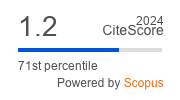Maternity and Time: The Perception of Time from Mothers During the 1st Year After Birth According to Titles in Bulgarian Internet Discussion
DOI:
https://doi.org/10.29038/eejpl.2017.4.2.todKeywords:
time, maternity, perception, metaphor, space, computer-mediated communication, linear time.Abstract
The aim of the paper is to present the perception of time of the women who have babies less than 12 months old through observation on some titles of so-called annual topics in the largest Bulgarian forum platform - bg-mamma. Using qualitative and quantitative methods, the study includes the investigation of time indicators preferred by the forum users in the excerpted 50 threads. Attention is drawn to the presence of subjective/objective time markers as well as of linear/cyclic ones. Furthermore, excerpted words and phrases indicating time have been studied having in mind that time is often metaphorically represented. The investigation also reveals the most important events in the mother's life as expressed by the titles of the topics. It seems to the researcher that in the first year of maternity women perceive the time in a very specific way – they put the baby growth as a measure and the objective time marks only disclose the changing baby world. It is also interesting that some traditional holidays become very important as well as the rituals connected to them.
References
- Берестнев Г. И. Время и язык „иной действительности“ в профетических текстах. Вестник
Балтийского федерального университета им. И. Канта. 2011. Вып. 8. С. 45-50. - Cini, M. (2014). Is Time Real? In: Direction of Time, (pp. 1-14). S. Albeverio, P. Blanchard (Eds.). Cham:
Springer. - Doble, R. (2014). Deconstructing Time. Second Edition: Illustrated Essay-blogs About the Human
Experience of Time. Morrisville: Lulu Press. Retrieved from http://rickdoble.net/ebooks/doble_
rick_pdf_ebook_deconstructing_time.pdf - Ефтимова А. Невербалната комуникация: медии и медиатори, София: Сиела, 2011.
Eftimova, A. (2011) Neverbalnata komunikacia: medii i mediatori [Non-verbal communication: media
and mediators]. Sofia: Siela. - Elias, N. (1986). Saggio sul tempo. Bologna: Il Mulino.
- Haspelmath, Martin (1997). From Space to Time. Temporal Adverbials in the World’s Languages,
München –Newcastle: LINCOM EUROPA. - Jarbou, S. (2017). The semantics-pragmatics interface: the case of the singular feminine demonstrative in
Jordanian Arabic. East European Journal of Psycholinguistics, 4(1), 63-75. - Lakoff, G. (1993). The contemporary theory of metaphor. In: Metaphor and Thought (2nd ed.), (pp. 202-251).
A. Ortony (Ed). Cambridge: Cambridge University Press. - Mathisen, Arve. (2012). Temporal design in auditors’ professional learning. In: Professional Learning in
the Knowledge Society, Karen Jensen, Leif Chr. Lahn, Monika Nerland (Eds.). (pp. 85-108),
Rotterdam: Sense Publishers. - Oesterdiekhoff, Georg. (2009). Mental growth of humankind in history, Norderstedt:BoD.
Савова Ив. Текст и време, Шумен: УИ „К. Преславски“, 2007 - Stalker, J. (1989) Communicative competence, pragmatic functions, and accommodation. Applied
Linguistics, 10(2), 182–193. Retrieved from: https://doi.org/10.1093/applin/10.2.182 - Todorova, B. (2010). The Bulgarian mothers’ forum as an institution of social change. In: Jezik, knjizevnost,
promene. Jezicka istrazivanja, (pp.120-131). Biljana Mišić Ilić, Vesna Lopičić (Eds). Niš: Sceroprint. - Тодорова Б. Время и материнство. Наука. Мысль. # 7. 2014, 91-102.
- Тодорова Б. Време и майчинство. Проблеми на социолингвистиката XI, София: МСД, 321-326
- Vicente, B. (2002). What pragmatics can tell us about (literal) meaning: A critical note on Kent Bach's
theory of implicature. Journal of Pragmatics, 34(4), 403–421. - Vukanović, M.& L. Grmuša. (2009). Capturing Space and Time: Mission (Im)Possible. In: Space and
Time in Language and Literature. Marija Brala Vukanović and Lovorka Gruić Grmuša (Eds).
(pp. 1-22), Сambridge Scholar Publishing.
References (translated and transliterated)
- Berestnev, G.I. (2011). Vremja i yjazyk “inoj dejstvitelnosti“ v profeticheskih tekstah [Time and
language of “another reality” in the prophetic texts], Vestnik Baltijskogo federaljnogo universiteta
im. I.Kanta, 8, 45-50. - Cini, M. (2014). Is Time Real? In: Direction of Time, (pp.1-14). S. Albeverio, P. Blanchard (Eds.).
Cham: Springer - Doble, R. (2014). Deconstructing Time. Second Edition: Illustrated Essay-blogs About the Human
Experience of Time. Morrisville: Lulu Press. Retrieved from http://rickdoble.net/ebooks/doble_
rick_pdf_ebook_deconstructing_time.pdf - Eftimova, A. (2011) Neverbalnata komunikacia: medii i mediatori [Non-verbal communication: media
and mediators]. Sofia: Siela. - Elias, N. (1986). Saggio sul tempo. Bologna: Il Mulino.
Haspelmath, Martin (1997). From Space to Time. Temporal Adverbials in the World’s Languages,
München – Newcastle: LINCOM EUROPA. - Jarbou, S. (2017). The semantics-pragmatics interface: the case of the singular feminine demonstrative in
Jordanian Arabic. East European Journal of Psycholinguistics, 4(1), 63-75. - Lakoff, G. (1993). The contemporary theory of metaphor. In: Metaphor and Thought (2nd ed.),
A. Ortony (Ed). (pp. 202-251), Cambridge: Cambridge University Press. - Mathisen, Arve. (2012). Temporal design in auditors’ professional learning. In: Professional Learning in
the Knowledge Society, Karen Jensen, Leif Chr. Lahn, Monika Nerland (Eds.). (pp. 85-108),
Rotterdam: Sense Publishers. - Oesterdiekhoff, Georg. (2009). Mental growth of humankind in history, Norderstedt:BoD.
Savova, Iv. (2007) Tekst i vreme [Text and time]. Shumen: Constantine of Preslav Univ. Press. - Stalker, J. (1989) Communicative competence, pragmatic functions, and accommodation. Applied
Linguistics, 10(2), 182–193. Retrieved from: https://doi.org/10.1093/applin/10.2.182 - Todorova, B. (2010) The Bulgarian mothers’ forum as an institution of social change. In: Jezik,
Knjizevnost, Promene. Jezicka Istrazivanja, (pp.120-131). Biljana Mišić Ilić, Vesna Lopičić (Eds).
Niš: Sceroprint. - Todorova, B. (2014a).Vremja i materinstvo [Time and maternity]. Science. Thought, 7, 91-102.
Retrieved from: http://wwenews.esrae.ru/pdf/2014/7/152.pdf - Todorova, B. (2014b) Vreme i maychinstvo [Time and Maternity]. In: Sociolinguistic Issues XI, Sofia:
Insoliso, 321-326. - Vicente, B. (2002). What pragmatics can tell us about (literal) meaning: A critical note on Kent Bach's
theory of implicature. Journal of Pragmatics, 34(4), 403–421. - Vukanović, M.& L. Grmuša. (2009). Capturing Space and Time: Mission (Im)Possible. In: Space and
Time in Language and Literature. Marija Brala Vukanović and Lovorka Gruić Grmuša (Eds).
(pp. 1-22), Сambridge Scholar Publishing.











 Creative Commons «Attribution» 4.0
Creative Commons «Attribution» 4.0